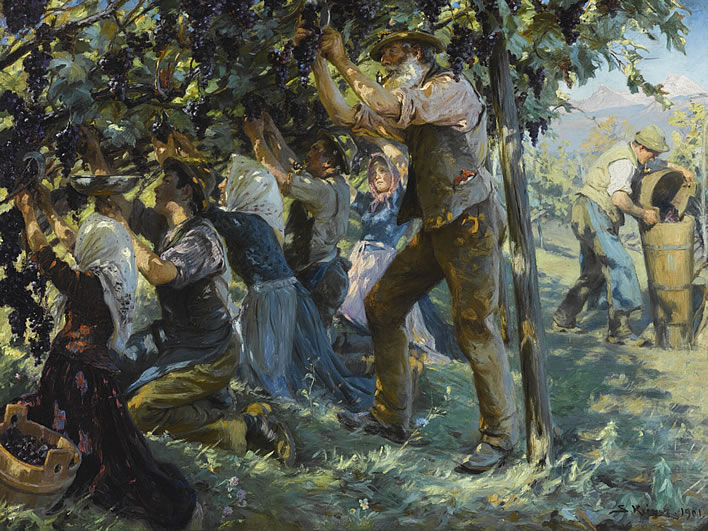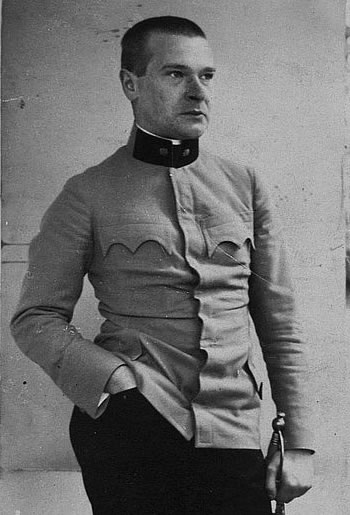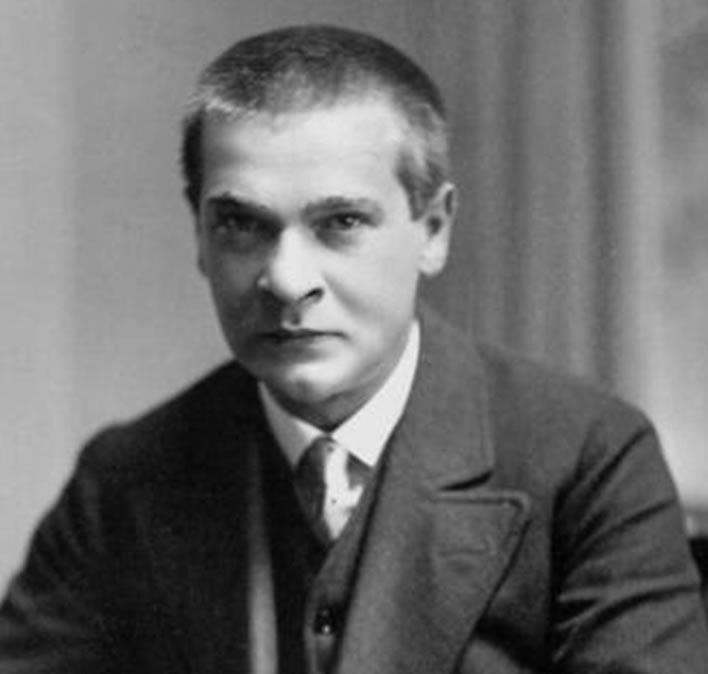Quote and image of the month 10.2019
Richard Law, UTC 2019-10-18 10:17
Peder Severin Krøyer, Wine Harvest in the Tyrol (1901)

Peder Severin Krøyer (1851-1909), Wine Harvest in the Tyrol, 1901. At auction in 2016 the painting was sold for 236,750 GBP, double its top estimate. Image: Sothebys. [Click to view a larger image in a new browser tab]
Georg Trakl, Verklärter Herbst / Transfigured Autumn (1912)
|
Verklärter Herbst
Gewaltig endet so das Jahr Mit goldnem Wein und Frucht der Gärten. Rund schweigen Wälder wunderbar Und sind des Einsamen Gefährten. |
Transfigured Autumn
The year ends tremendously with golden wine and the fruit of gardens. The woods around are wonderfully silent and are the companions of the solitary. |
| Da sagt der Landmann: Es ist gut. Ihr Abendglocken lang und leise Gebt noch zum Ende frohen Mut. Ein Vogelzug grüßt auf der Reise. |
The farmer says: It is good. You evening bells ringing long and soft give cheer until the end. A migrating flock of birds sends greetings on its journey. |
| Es ist der Liebe milde Zeit. Im Kahn den blauen Fluß hinunter Wie schön sich Bild an Bildchen reiht — Das geht in Ruh und Schweigen unter. |
It is a gentle time for love. In the boat floating down the blue river how beautifully scene follows scene — that disappears in peace and silence. |
Georg Trakl, Verklärter Herbst, first published in the fortnightly literary magazine Der Brenner, year 3, Heft 3, Innsbruck, 1 November 1912, p 109. This text follows that of Georg Trakl: Das dichterische Werk, München 1972, p. 22-23. Online.
'In the boat floating down the blue river' – if you think this is just another soppy autumn poem, you should think again. Shortly after that metaphor of gliding through life in a series of cinematic scenes, Trakl's boat arrived at the great waterfall of the First World War.
In his second autumn after writing this, the twenty-seven year old Trakl volunteered at the beginning of the First World War as a medical assistant in the Austro-Hungarian army.

There was no 'phoney war' for him: The hostilities between the Austro-Hungarians and the Russians in western Ukraine had already begun towards the end of August. All the pre-war glorifications were driven out of the heads of even the most bellicose people shortly thereafter as the masses began to be herded into the military-industrial meat-grinder that would turn for the next four years.
On 7 September Lieutenant Trakl was involved as a 'military pharmacist' in the Battle of Gródek (near Lemburg, in western Ukraine).
He served in the hospital tents, which were overflowing with around a hundred seriously wounded and dying soldiers. Effectively left to his own devices in the chaos, he looked after them for two full days and nights under appalling conditions, with scarcely any medical supplies or anaesthetics for operations – two days of sleepless helplessness.
From that boat floating down the blue river he had seen and heard things in that autumn that could not be unseen or unheard and for which there would be no more peace and no more silence for him.
Dying warriors, the wild lamentations from their broken mouths.
Sterbende Krieger, die wilde Klage / Ihrer zerbrochenen Münder. Grodek
Even his own side treated the local Ukrainian population – subhumans before the Nazis popularised the term – with bestial brutality. All these scenes of the realities of war acted on a mind that had suffered for years from depression and panic attacks: a profound nervous breakdown followed.
His comrades prevented his attempt to shoot himself. He then vainly tried to flee, only to end up, obviously deranged, in a military hospital in Cracow. At some time during this period he wrote his last poem Grodek – also an autumnal poem, but we shall spare you that.
He died of a cocaine overdose on the evening of 3 November 1914, thus passing over the waterfall one hundred and five autumns ago.

0 Comments UTC Loaded:
Input rules for comments: No HTML, no images. Comments can be nested to a depth of eight. Surround a long quotation with curly braces: {blockquote}. Well-formed URLs will be rendered as links automatically. Do not click on links unless you are confident that they are safe. You have been warned!